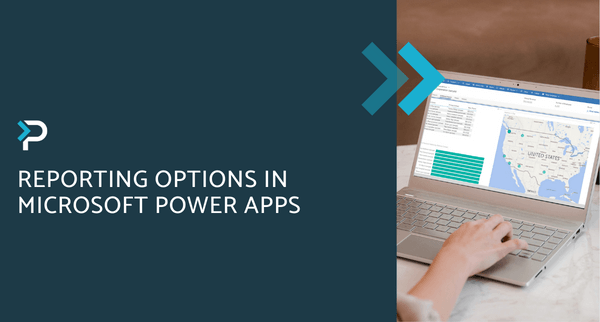Power Apps vs Dynamics 365: Choosing the Right Microsoft Solution for Your Business
Power Apps vs Dynamics 365: Choosing the Right Microsoft Solution for Your Business
February 14th, 2024
6 min read
The implementation of technology to facilitate digital transformations, enhance productivity, and drive sustainable business growth, has become standard practice across many industries.
Two stand-out solutions to do this are Microsoft Power Apps and Microsoft Dynamics 365. Both platforms excel in centralising data, automating workflows, and streamlining operations. Because of this similarity, organisations frequently seek clarification on when each solution should be used and if there are any differences between them.
Is there a difference between Dynamics 365 and Power Apps?
The simple answer is yes, these solutions are different and are used to fulfil distinctly different purposes.
Power Apps is one of the pillars of the Power Platform, and these are built from the ground up. Given their customisable nature, they are suitable for any industry, business size, and need. This solution is often used when standard applications cannot meet the unique requirements of a business. Consequently, Power Apps can be highly versatile, catering to needs ranging from simple mobile apps, like a holiday planner, to complex systems such as course management software.
Microsoft Dynamics 365, on the other hand, is designed for organisations seeking to implement more traditional CRM and ERP capabilities, covering Sales, Marketing, Customer Service, and much more. Organisations therefore looking to streamline these areas should explore Dynamics 365 initially to see if this is a good fit. It’s worth noting that even though Dynamics 365 Applications come with some pre-built functionality, the systems are highly customisable and can be adapted to fit your specific requirements.
For a more detailed comparison between both of these applications, including cost, features, customisability, integration capabilities, and more, read more below.
Understanding Power Apps and Dynamics 365
What are Power Apps?
With Power Apps, users can build tailored solutions to streamline processes, automate tasks, and solve specific business challenges efficiently. Its versatility empowers individuals and organisations to rapidly develop apps tailored to their unique needs, fostering innovation and enhancing productivity.
To understand more about what Power Apps can do have a read of our blogs: Business Benefits of Power Apps or Examples and Use Cases of Power Apps.
What is Microsoft Dynamics 365?
On the other hand, Dynamics 365 provides a comprehensive suite of CRM (Customer Relationship Management) and ERP (Enterprise Resource Planning) solutions. Applications within Dynamics 365 are created to help streamline specific business departments, such as sales, marketing, customer service, HR and more. Pragmatiq specialises in the CRM side of Dynamics 365, and we have a reputable partnership network to support ERP projects. If this is of interest, please reach out to book a complimentary discovery call with one of our experts.
Power Apps vs Dynamics 365: Similarities
Despite their differences, Power Apps and Dynamics 365 share some common ground, including:
Microsoft Ecosystem Integration
Both solutions seamlessly integrate with other Microsoft products and services, such as Microsoft 365, Azure, and Power BI, enhancing collaboration and data analysis capabilities. This centralises operations within one space, enhancing collaboration and informed decision-making.
Cloud-Based
Power Apps and Dynamics 365 are cloud-based platforms, providing scalability, accessibility, and ease of deployment without the need for extensive IT infrastructure.
Customisation
Both platforms have the ability to be tailored specifically to an organisation’s processes and needs, allowing for applications to fit exactly around your requirements. However, it should be mentioned that Power Apps are built from the ground up, while Dynamics 365 has some out-of-the-box functionality that can be customised.
Differences between Power Apps and Dynamics 365
There are also some distinct differences between Power Apps and Dynamics 365:
Scope and Functionality
As previously mentioned, Power Apps can cover a large variety of functionalities, the possibilities of solutions that can be created are endless and are designed to solve specific business scenarios. Dynamics 365, on the other hand, offers more pre-built functionality for departmental scenarios, such as sales, customer service, marketing and more.
Power Apps Example
Find out how a Power App increased the speed of the referral turnaround by 100%, going from 16 days to 8 days at the Brighton Therapy Centre.
Dynamics 365 Example
Explore how the implementation of Dynamics 365 increased operational efficiency and employee productivity by an estimated 20% at George Davies Turf.
Focus and Target Audience
Power Apps targets a wider audience, including business users, citizen developers, and IT professionals looking to streamline processes and create custom apps. Dynamics 365, meanwhile, caters to medium to large enterprises seeking comprehensive CRM and ERP solutions to manage various aspects of their business operations.
Cost
- Power Apps: With its pay-as-you-go pricing model and lower upfront costs, Power Apps is a cost-effective solution for startups and SMBs looking to kickstart their digital transformation journey.
- Dynamics 365: While Dynamics 365 may require a higher initial investment, particularly for enterprise-level deployments, its extensive features and scalability make it a valuable investment for large enterprises seeking comprehensive business management solutions.
Choosing the Right Solution for Your Business Power Apps or Dynamics 365?
When deciding between Power Apps and Dynamics 365, consider the following factors:
- Business Needs: Evaluate your organisation’s specific requirements, including the complexity of processes, the size of your business, and the need for CRM and ERP functionalities.
- If one of the existing Dynamics 365 applications suits your needs then this is probably the best option, however, if your requirements are niche and do not fit into any of the offerings then going down the Power Apps route may be the right choice.
- Budget: Consider the cost implications of each solution, including licensing fees, implementation costs, and ongoing maintenance expenses. Power Apps tend to work out cheaper in terms of licensing but may require more investment in the future.
- Resources and Expertise: Assess your team’s skill level and capacity for development and maintenance. Power Apps may be more suitable if you have limited technical resources, while Dynamics 365 may require more extensive IT support. In many cases, the best solution is to work closely with a Microsoft Partner who can advise you on the best possible approach.
- Scalability: Anticipate future growth and scalability requirements. Dynamics 365 offers a more comprehensive suite of enterprise-level solutions, making it suitable for businesses planning to expand and evolve their operations.
As a Microsoft Solutions Partner, Pragmatiq are experts in both Dynamics 365 and Power Apps, book your free discovery call today to discuss requirements and the best possible approach for your organisation.
Power Apps and Dynamics 365
In the above blog, we have explained when each of these solutions should be used, however, it is not uncommon for organisations to implement both within their organisations. For instance, a company might adopt Dynamics 365 for Sales to streamline sales data while also requiring an application (Power App) for managing event tickets. These two applications seamlessly integrate with each other, providing organisations with a unified platform to track all information and processes.
Speak to PowerApps and Dynamics 365 Experts
Whether you’re a small business aiming to streamline operations or a large enterprise seeking growth and innovation, Microsoft offers powerful solutions tailored to your needs. If you are looking to implement either of these solutions in your organisation, then please do reach out.
Alternatively, if you are unsure which is best for you, but recognise the challenges you are facing, we can help to discover the best route for you. Our Microsoft Dynamics 365 (CRM) and Power Platform experts are on hand to advise you, so please contact us at info@pragmatiq.co.uk or call us on 01908 038110.
Want to keep in touch?
Sign up to our newsletter for regular updates.
"*" indicates required fields


